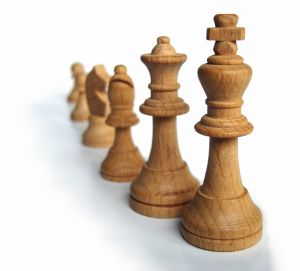The path to chess improvement lies in finding your weakest area of knowledge and placing all of your effort into converting it into a strength. My greatest weakness is an apprehension, bordering on fear, of delving into deep calculations and analysis. This analytical deficiency affects both my combinational and analysis in over the board play , and unless I work to improve these skills, any future chess improvement will be difficult. You tend to avoid or procrastinate working on your weakest area and this is part of the reason why you lack proficiency, since you do not exert the necessary effort in mastering the material that gives you trouble.
Strengthening Your Weaknesses
Whatever your weaknesses may be, you must identify them and apply great effort and patient focus to turn them into strengths. Here are some ideas in converting your weaknesses into strengths:
- Focus – Give all of your attention to your training, and eliminate distractions when studying.
- Practice – Practice daily, but create a varied training schedule that provides you with a fresh perspective every time you train. Your practice should revolve around material that address your weakest area.
- Effortful Study – Always give 100% during every training session, and do not hesitate to cross your comfort zone during each training session. Each session should build upon the last either in intensity or difficulty.
- Play – Playing allows you to transfer the knowledge and skills picked up in your training environment to real over the board play.
- Integrate thought process into your practice.
Discovering Your Weaknesses
If you are unsure as to which areas you need to work on the most the following tips might help you to identify the weaknesses in your game:
- Review your games with a teacher or a stronger player.
- Perform the Khmelnitsky Chess Exam to find your weak areas.
- If you are unable to find a stronger player or a teacher, go over a minimum of 10 of your long games. Do a first pass of the game on your own, and then have a chess engine review it. Determine why you lost each of these games, and create a training plan to address the top 1-2 weaknesses you discover.
My Training Modifications
- Spend 80% of my study time working on analytical positions that require both analysis and calculation.
- Continue my tactics study program.
- Play long games that allow the time necessary to work on my thought process as well as the training of analysis and combinational skills.
- Play over annotated master games using “Guess the Move” method.
- Use a physical board for the majority of my training.
 The brain needs time to assimilate and integrate new information as knowledge and to resolve conflicts with previously learned concepts and plateaus equate to slower progress while we assimilate new ideas. Not until we internalize these new ideas as knowledge are we able to move on to the next phase in our learning. Plateaus are a normal phase of the learning process. The goal is to minimize the amount of time spent in a plateau, and to identify if our plateau is part of the normal learning curve or if it is a result of a deficiency in our learning process.
The brain needs time to assimilate and integrate new information as knowledge and to resolve conflicts with previously learned concepts and plateaus equate to slower progress while we assimilate new ideas. Not until we internalize these new ideas as knowledge are we able to move on to the next phase in our learning. Plateaus are a normal phase of the learning process. The goal is to minimize the amount of time spent in a plateau, and to identify if our plateau is part of the normal learning curve or if it is a result of a deficiency in our learning process.